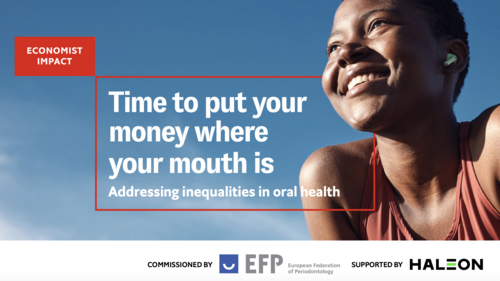![]()
13 February 2024
New EFP white paper calls for global action on oral health inequalities
Categories:Communication, Institutional

In an impactful new white paper titled Time to put your money where your mouth is: addressing inequalities in oral health, experts shed light on the growing global challenge posed by periodontitis and caries, two of the most common yet preventable oral diseases.
Published today, the Economist Impact report commissioned by the European Federation of Periodontology with support from Haleon, emphasises the urgent need for a unified approach to improve both oral and systemic health outcomes across populations, examining data from six countries (Brazil, France, Germany, Italy, Indonesia and the UK) and introducing an innovative caries prevention and care cost calculator, that reveals direct treatment costs of $357 billion yearly.
The findings are staggering, disclosing that direct treatment costs for caries alone represent a significant 4.9% of global health expenditure. Additional productivity losses due to caries, severe periodontitis, and tooth loss are estimated to be $188 billion annually. With nearly half of the world's population affected by oral diseases, surpassing most common non-communicable diseases (NCDs), the white paper calls for urgent action. Dental caries impact more than two billion people worldwide. Severe gum disease follows with over one billion cases.
The report, initiated and contributed to by Professor Nicola West, EFP secretary general, underscores the direct correlation between oral health and overall health. Oral diseases not only lead the pack in global prevalence but are also largely preventable. West urges policymakers and budget holders to prioritise oral health, stating: "Oral health is key to overall health."
Drawing on the success of the previous Economist Impact white paper on the cost of gum disease which showcased the benefits of home-based preventive care and early diagnosis, the new report introduces a ground-breaking conceptual framework for the progression of caries. This model outlines preventive interventions, including the use of fluoridated toothpaste and topical fluoride, aimed at halting or preventing the development of caries at various stages.
Steve Mason, Global Medical Lead for Oral Health at Haleon, said: “As a global leader in consumer health, Haleon’s purpose is to deliver better everyday health with humanity. We are proud to have supported this initiative from both the EFP and Economist Impact Unit. It represents a further important step to better understand and raise awareness of the importance of oral health promotion and prevention, to help support the WHO action plans on oral health.”
The publication marks a critical step towards addressing the global oral health crisis. By targeting common risk factors such as diet, tobacco, and alcohol use, there is a transformative opportunity to not only mitigate oral diseases but also NCDs linked to oral health, including diabetes, heart disease, cancer, and stroke.
The call to action is clear: it is time for stakeholders to invest in and champion preventive measures, promoting better alignment between policy, public health, payment systems, and clinical practice. This white paper sets the stage for a necessary paradigm shift in global oral health, urging immediate and decisive action to combat the inequalities plaguing oral health care worldwide: time for stakeholders to put money where their mouth is.




